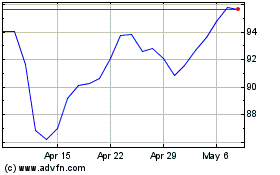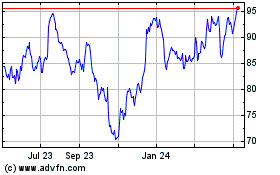Moving large bundles of shares has become a brisk business for
deal-starved banks
By Maureen Farrell, Corrie Driebusch and Matt Jarzemsky
Just before the Thanksgiving holiday, Morgan Stanley bought
about 3 million shares of insurer James River Group Holdings Ltd.
from hedge fund D.E. Shaw Group. Its intention was to resell the
shares at a profit before the market opened the next day.
It is unclear exactly how Morgan Stanley did on the roughly $117
million purchase. It stood to make $1 on every share it sold on to
investors, Dealogic estimates, but it isn't known how many it
unloaded.
The so-called block trade drew attention on Wall Street, not
because of the potential profit but because the number of shares
was equivalent to more than 30 days of average trading volume in
James River stock. In a typical year, traders say, a bank would
rarely buy more than 10 or 20 days' worth of shares, mindful of the
risk of being unable to unload them without sustaining a loss.
But it's far from a normal year, and Morgan Stanley isn't alone
in taking a more aggressive approach to block trades.
A stalled IPO market has left banks across Wall Street to fight
for the deals, which carry lower margins and higher risk than other
share sales that form the heart of the equity-capital-markets
business.
This year is now the biggest year ever for block-trading
activity, with more than $85 billion worth of U.S.-listed shares
sold, according to Dealogic. In all of 2015, the previous record
year, there were about $62 billion worth of shares sold.
Meanwhile, 2016 is on track to be the slowest for U.S.-listed
initial public offerings in 13 years amid factors including a
proliferation of attractive private-funding options.
Banks have traditionally served as middlemen in stock offerings,
a lucrative assignment in which they line up buyers to purchase
shares directly from companies. In contrast, with a block trade, a
bank buys stock from a public company or one of its big investors
at a discount and then tries to flip it at a profit. If the share
price falls before it can move the stock, however, the bank faces a
possible loss. That makes block trading a riskier proposition for
banks than traditional underwriting.
It's no mystery why stock sellers like this approach: They are
guaranteed a set price, and if the shares subsequently fall, they
don't take the hit.
There was $11.6 billion in stock sold in the U.S. through block
trades in November, according to Dealogic. That makes it the third
busiest month on record, behind this August and March of last year,
which was No. 1.
The rise of block trading has led to big changes in how
companies and investors approach stock sales.
"Sellers' attitudes and preferences have changed. They want
price certainty and minimal market risk," said Felipe Portillo,
managing director of equity-capital-market syndicate at Credit
Suisse Group AG. "Buyers have also learned to be ready and are
comfortable making quick investment decisions."
The surge in block trades has dealt a blow to
equity-capital-markets desks across Wall Street. Fees in the U.S.
are on pace to hit a low of 20-plus years in 2016, according to
Dealogic. Through Dec. 1, banks had generated $4.9 billion in
equity-capital-markets fees this year, down 34% from the same time
last year. Block trades accounted for roughly 42% of the business,
the largest share ever by a wide margin.
And the field is becoming more competitive, which in some cases
has prompted banks to take on more risk facilitating the deals. As
block trades become more popular, banks sometimes find themselves
in bidding wars to win deals. Before the financial crisis, only a
handful of banks participated in the deals, but now smaller players
are getting in on the action too. In November, midsize Chicago bank
William Blair & Co. led its first block deal since 2003,
according to Dealogic.
Citigroup Inc. has typically been one of the biggest players in
block trades, executing more than $46 billion worth between the
start of 2011 and the end of 2015, according to Dealogic. So far
this year, the bank has facilitated roughly $8 billion in block
deals, placing it in sixth, according to Dealogic. Goldman Sachs
Group Inc. and J.P. Morgan Chase & Co. are first and second
this year, underwriting $16.5 billion and $15 billion,
respectively, in U.S.-listed block trades.
Rising stocks have helped banks unload recent blocks at a
profit, and there are scant examples of big losses. But that could
quickly change recent market gains reverse, which in turn could
dampen enthusiasm by banks to bid on deals, analysts say.
Indeed, behind many of the recent deals are private-equity firms
cashing out. The flood of selling by sophisticated investors could
be a sign of a market top -- though such firms do face pressure to
exit investments and return cash to their backers.
In November alone, KKR & Co. sold its remaining $1.67
billion stake in drugstore chain Walgreens Boots Alliance Inc. and
Blackstone Group LP sold shares of Summit Materials Inc., Hilton
Worldwide Holdings Inc., Extended Stay America Inc., Performance
Food Group Co. and Hudson Pacific Properties Inc.
Also, if the IPO market returns to more normal levels next year,
as is widely expected, block-trading volume could decline somewhat,
bankers say.
"As IPO volume picks up, people will become more rational," said
Mr. Portillo of Credit Suisse.
Write to Maureen Farrell at maureen.farrell@wsj.com, Corrie
Driebusch at corrie.driebusch@wsj.com and Matt Jarzemsky at
matthew.jarzemsky@wsj.com
(END) Dow Jones Newswires
December 07, 2016 02:48 ET (07:48 GMT)
Copyright (c) 2016 Dow Jones & Company, Inc.
Morgan Stanley (NYSE:MS)
Historical Stock Chart
From Mar 2024 to Apr 2024

Morgan Stanley (NYSE:MS)
Historical Stock Chart
From Apr 2023 to Apr 2024
